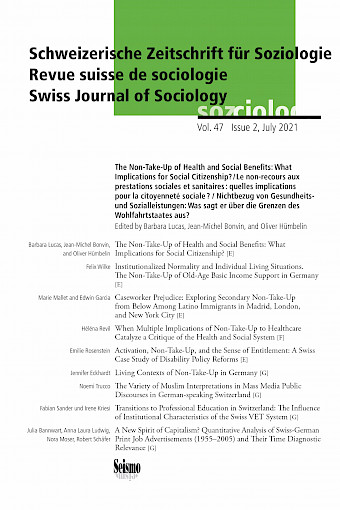
ISBN 978-3-03777-254-6
216 Seiten
2021
Format 15.5 x 22.5 cm
broschiert
In den Warenkorb
SFr. 48.00 / € 44.00Nichtbezug von Gesundheits- und Sozialleistungen: Was sagt er über die Grenzen des Wohlfahrtsstaates aus?
Barbara Lucas, Jean-Michel Bonvin, Oliver Hümbelin (Hrsg.)
Seit den 1960er Jahren befasst sich eine spezifische Literaturströmung der Soziologie des Wohlfahrtsstaates mit dem Phänomen des Nichtbezuges, d.h. mit Menschen, die Anspruch auf Sozialleistungen haben, diese aber nicht erhalten. In den letzten Jahren gewann diese Thematik zunehmend an Aufmerksamkeit und erreicht die politische Agenda, auch in der Schweiz. Wenn einige Menschen es vorziehen, ihre Rechte nicht in Anspruch zu nehmen, stellt es sowohl die Bedingungen für den Zugang zu Sozialleistungen als auch deren angemessene Ausgestaltung oder gar deren Legitimität in Frage.
Was sagt der Nichtbezug über die vorherrschende Sozialpolitik aus? Können wir daraus etwas über die zugrunde liegenden Normen dieser Politik lernen? Wie kann der Nichtbezug aus der Perspektive von Betroffenen verstanden werden? Übernehmen die (potenziell) Anspruchsberechtigten die vorherrschenden Normen oder ist er ein Ausdruck des Widerstandes? Können öffentliche Dienste ihren Auftrag der Grundversorgung von vulnerablen Gruppen überhaupt erfüllen, wenn diese den Angeboten fernbleiben?
Diese Sonderausgabe beginnt mit einer Einführung in das Thema des Nichtbezuges von Gesundheits- und Sozialleistungen und konzentriert sich dabei besonders auf den Forschungsstand in der Schweiz. Auf dieser Auslegeordnung aufbauend wird das Thema anschliessend analytisch weiterentwickelt. Damit wird eine Einordnung des Nichtbezuges möglich, die zur Analyse der Beziehung von BürgerInnen und Wohlfahrtsstaat genutzt werden kann. Die fünf Autoren des Sonderhefts tragen auf drei verschiedene Arten zu dieser neuen Forschungsagenda bei: indem sie die zeitliche Dimension des Nichtbezuges betonen; indem sie eine Sichtweise der Betroffenen als fähige und kritische Akteure unterstützen; und indem sie für einen systemischen und relationalen Ansatz des Nichtbezuges plädieren.
Depuis les années 1960', un courant de la sociologie des politiques sociales thématise le 'non-recours', i.e. le fait que des personnes ne bénéficient pas des prestations sociales ou de santé qui leur sont pourtant destinées. D'abord perçu comme marginal, cet enjeu est devenu saillant et atteint aujourd'hui les agendas politiques, y compris en Suisse. Le non-recours questionne en effet les conditions d'accès aux prestations sociales, mais aussi leur pertinence, voire leur légitimé quand certain.e.s préfèrent ne pas faire valoir leur droit.
Que nous apprend le non-recours sur les objectifs des politiques sociales et la manière dont ceux-ci sont perçus par les populations concernées ? Que nous dit-il des normes qui sous-tendent ces politiques, de leur approbation ou de leur rejet par les publics concernés? Que nous apprend-il sur le fonctionnement des services publics et leur capacité à atteindre et soutenir les populations précarisées ?
Ce numéro spécial s'ouvre sur une introduction à la question du non-recours aux prestations sociales et de santé. Celle-ci dresse un bref état des savoirs, y compris en Suisse; sur cette base, elle propose de mobiliser l'analyse du non-recours pour éclairer la reconfiguration des relations entre l'Etat et les citoyen.e.s. Les cinq contributions qui suivent participent à ce nouvel agenda de recherche de trois manières: en mettant en évidence la dimension temporelle du non-recours; en considérant les publics des politiques sociales en tant qu'acteurs capables et critiques et en plaidant pour une approche systémique et relationnelle du non-recours.
Since the 1960s, a specific stream of literature in the field of social welfare has been concerned with the phenomenon of non-take-up, i.e. people who are entitled to social benefits but do not receive them. This issue of non-take-up is becoming increasingly salient and reaching policy agendas, including in Switzerland. It questions both the conditions of access to social benefits and their adequacy or even legitimacy when some people prefer not to claim their rights.
What does non-take-up say about the aims of social policies and the way they are perceived by concerned people? What does it say about the underlying norms of those policies and the ways these norms are incorporated or contested by (potential) beneficiaries? What does it say about the public service and its capacity to reach its communities and support them?
This special issue starts with an introduction to the topic of non-take-up of health and social benefits, focusing more specifically on the case of Switzerland. Building on this state of the art, the agenda is further developed to explore what non-take-up of social benefits says about the reconfiguration of the relationship between citizens and the state. The five authors of the special issues contribute to this new research agenda in three different ways: by emphasizing the temporal dimension of non-take-up; by supporting a view of recipients as capable and critical actors; and by arguing for a systemic and relational approach to non-take-up.
